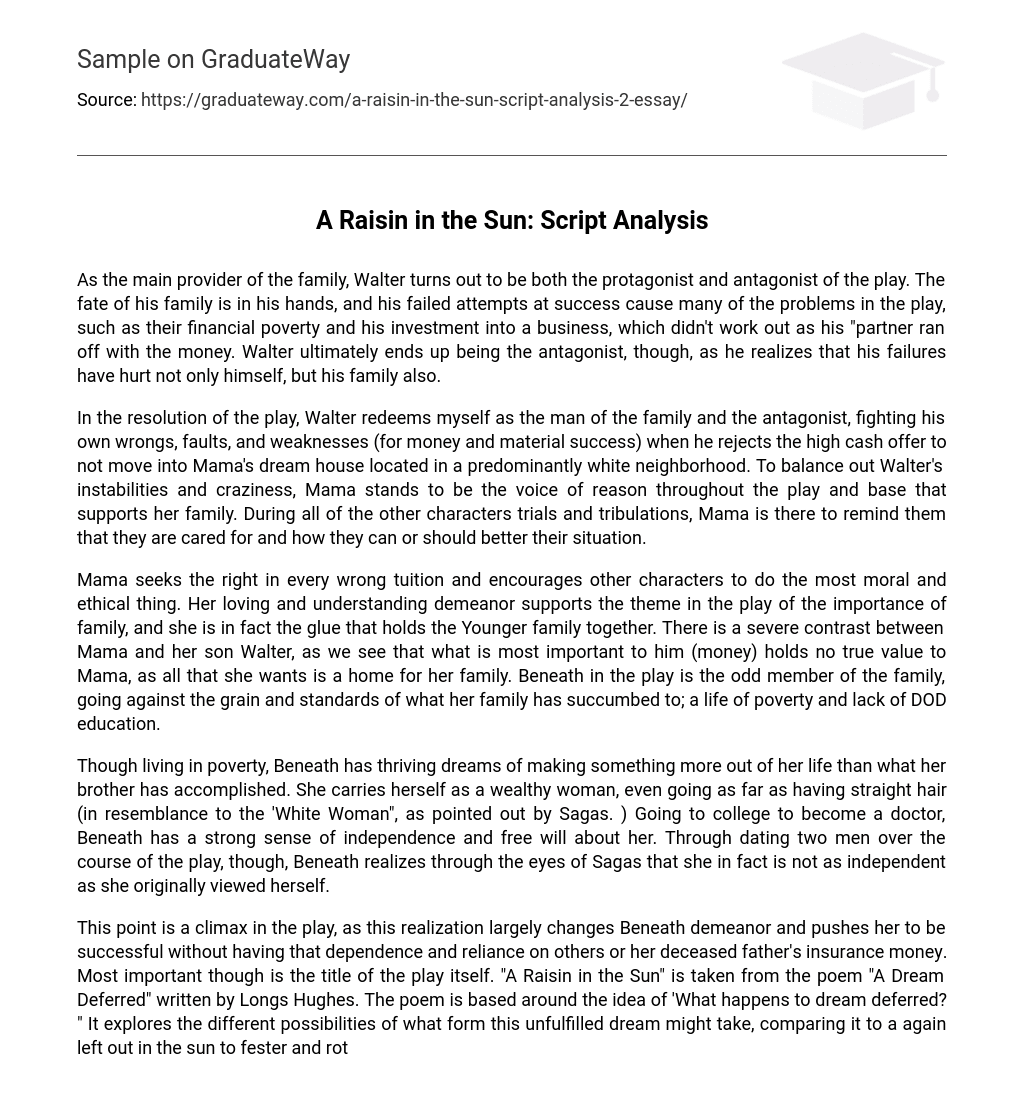Walter, the main provider for the family, plays both the protagonist and antagonist roles in the play. The destiny of his family rests on his actions, and his unsuccessful endeavors lead to various challenges, including financial struggles and a failed business venture where his “partner ran off with the money.” Nonetheless, Walter eventually becomes the antagonist as he recognizes that his failures have inflicted harm not just on himself, but also on his family.
In the play’s resolution, Walter redeems himself as the man of the family and antagonist by confronting his own mistakes, flaws, and desires for wealth when he turns down a tempting offer of money to not move into Mama’s dream house situated in a predominantly white neighborhood. To counterbalance Walter’s instability and irrationality, Mama assumes the role of a rational voice throughout the play and provides a foundation for her family. Amidst the struggles faced by the other characters, Mama serves as a constant reminder that they are loved and highlights potential ways they can improve their circumstances.
Mama’s role in the play is to seek justice in every unjust tuition and to encourage other characters to act morally and ethically. Her loving and understanding nature supports the play’s theme of the importance of family, making her the glue that holds the Younger family together. In contrast, Mama’s son Walter values money above all else, whereas Mama simply desires a home for her family. Additionally, there is an unconventional family member who rebels against the poverty and lack of access to education that the rest of the family has accepted.
Despite her poverty, Beneath has ambitious dreams of achieving more in her life compared to her brother. She presents herself as a wealthy woman, even emulating the appearance of a “White Woman” by straightening her hair, as observed by Sagas. Aspiring to become a doctor and attending college, Beneath possesses a strong sense of autonomy and determination. However, through her relationships with two men during the play, she comes to acknowledge, through the perspective of Sagas, that her perceived independence was not as genuine as she initially presumed.
In the play, this moment is significant as it represents a turning point for Beneath. It prompts her to change her behavior and strive for success on her own, without relying on others or her late father’s insurance money. It’s also worth mentioning the play’s title, “A Raisin in the Sun,” which is derived from Longs Hughes’ poem “A Dream Deferred.” This poem poses the question of what becomes of an unfulfilled dream and examines different possibilities by comparing it to a raisin left out in the sun to wither and decay.
The raisin in question symbolically represents each family member’s dreams in the play, making it crucial in a symbolic manner. Walter’s dream, when compared to the raisin, appears withered and diminished. His desire for wealth has been repeatedly thwarted, leading to frustration and despair. The failure of his aspirations not only compels him to strive harder but also drives him to resort to risky and irresponsible investments. Simultaneously, this dream serves as the catalyst for emotional turmoil within his family.
Walter and his wife’s relationship became so distant that she felt neglected to the extent that he didn’t even know about her pregnancy and plan to have an abortion. On the other hand, Mama’s dream of giving her family a home and a better life didn’t face the same outcome as Walter’s. Her dream, described as a raisin “crusted and sugared over – like a syrupy sweet,” remained unwavering despite enduring years of poverty. It was a dream that both she and her deceased husband devoted their lives to accomplishing.
Mama had patience and never rushed her dream. She always believed that one day, she would find a better life and home with a beautiful flower garden. From a young age, Mama envisioned this life for herself and her family. Although it took time to achieve, her dream gradually became more enticing and satisfying. Mama’s dream was not only fulfilled when she moved into a house in a white neighborhood, but it also became even more fulfilling as time passed.
While living in the apartment, Mama constantly tended to a plant in the windowsill. This symbolized her hope for a bigger dream of having a home where she could cultivate a garden of plants, unaffected by pots, and free to thrive in the soil. This aspiration was shared by the Younger family, as they longed to break free from their limitations of poverty and racial inequality.





